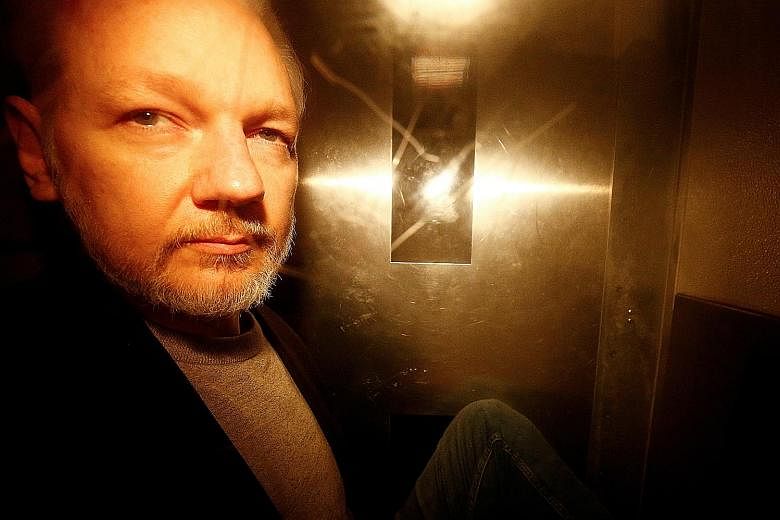LONDON • The full hearing to decide whether WikiLeaks founder Julian Assange should be extradited to the United States to face accusations including spying charges will take place in February, a London court ruled yesterday.
Assange, 47, faces 18 counts in the US including conspiring to hack government computers and violating an espionage law. He could spend decades in prison if found guilty.
Washington on Tuesday submitted a formal extradition request to Britain after Ecuador terminated the Australian's seven-year asylum in its London embassy in April.
Assange told the Westminster Magistrates' Court: "175 years of my life is effectively at stake."
"It is important that people aren't fooled into believing that WikiLeaks is anything but a publisher," said Assange, who appeared by video link from a London prison, dressed in a grey T-shirt and wearing black-framed glasses. "The US government has tried to mislead the press," he said.
As Mr Ben Brandon, the lawyer representing the US, ran through a summary of the charges against Assange, including that he had cracked a US Defence network password, the Australian said: "I didn't hack anything."
Assange came to prominence when WikiLeaks in 2010 published a trove of classified military and diplomatic files about US bombing campaigns in Afghanistan and Iraq, angering Washington which said he had put lives at risk.
WikiLeaks' initial revelations about civilian casualties and embarrassing statements made by US officials about foreign leaders were published in coordination with newspapers such as The New York Times and The Guardian. Those stories redacted the names and personal details of US operatives and local informants whose lives could have been endangered.
But WikiLeaks found the arrangement too confining and published the entire load of unedited cables and video files on its website.
Assange's supporters hail him as a hero for exposing what they describe as abuse of power by modern states and for championing free speech.
He spent almost seven years holed up at the Ecuadorean embassy in London where he fled in 2012 to avoid extradition to Sweden. Stockholm wants to question him over allegations of rape.
He was dragged from the embassy on April 11, and jailed for 50 weeks for skipping bail.
The US has since charged Assange with numerous offences including espionage, saying he unlawfully published the names of secret sources and conspiring with former army intelligence analyst Chelsea Manning to obtain access to classified information.
Manning was arrested and convicted by military court martial for leaking the government reports.
Mr Brandon said Assange's actions had been dangerous and, "by publishing the unredacted material, (he) created grave and imminent risk that many intelligence sources, including journalists, human rights defenders and political activists would suffer serious physical harm or arbitrary detention".
However, Assange's lawyer Mark Summers said the charges were an "outrageous and full-fronted assault on journalist rights and free speech" and that his client did not have access to a computer to allow him to follow the case.
He told the court that Assange, who had been too ill to attend the previous hearing in May, was receiving healthcare.
Judge Emma Arbuthnot said the full extradition case would be heard in the week starting Feb 25 next year.
REUTERS

